Unit 3 Could you please clean your room教案设计
2019年八年级英语下册 Unit 3 Could you please clean your room知识点总结 (新版)人教新目标版
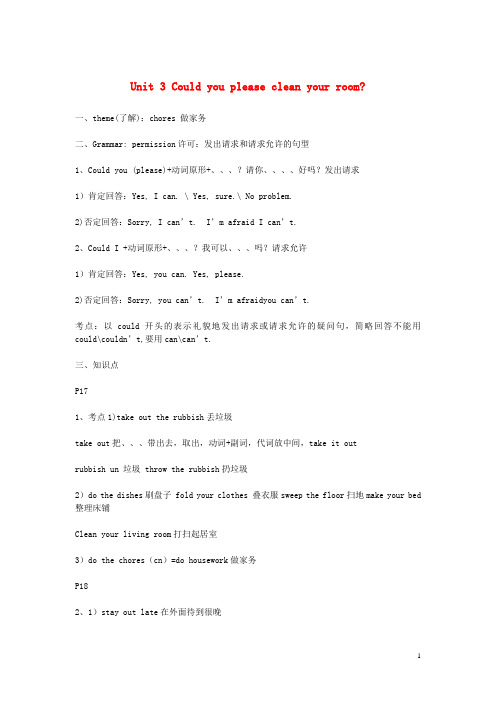
Unit 3 Could you please clean your room?一、theme(了解):chores 做家务二、Grammar: permission许可:发出请求和请求允许的句型1、Could you (please)+动词原形+、、、?请你、、、、好吗?发出请求1)肯定回答:Yes, I can. \ Yes, sure.\ No problem.2)否定回答:Sorry, I can’t. I’m afraid I can’t.2、Could I +动词原形+、、、?我可以、、、吗?请求允许1)肯定回答:Yes, you can. Yes, please.2)否定回答:Sorry, you can’t. I’m afraidyou can’t.考点:以could开头的表示礼貌地发出请求或请求允许的疑问句,简略回答不能用could\couldn’t,要用can\can’t.三、知识点P171、考点1)take out the rubbish丢垃圾take out把、、、带出去,取出,动词+副词,代词放中间,take it outrubbish un 垃圾 throw the rubbish扔垃圾2)do the dishes刷盘子 fold your clothes 叠衣服sweep the floor扫地make your bed 整理床铺Clean your living room打扫起居室3)do the chores(cn)=do housework做家务P182、1)stay out late在外面待到很晚2)get a ride 搭便车 3)need to do sth 需要做某事(need实义动词)need do sth(情态动词)4)have to do sth 不得不做某事3、1)help (sb) out with sth帮助(某人)做某事(常指帮助某人摆脱困境)2)at least至少3)finish doing sth做完某事4、1)Two hours of TV isenough for you.短语(名词短语、现在分词短语、不定式短语)作主语,谓语动词用单数。
Unit3 Could you please clean your roo1

Unit3 Could you please clean your room?Section A(1a-2d)学习目标: 1.掌握1a-2d的词语2.学习提出礼貌的请求和请求允许;3.学会使用句型:Could you please...?和Could I...?;学习重点:掌握一些家务活动相关的动词短语。
掌握情态动词could的用法和助动词do的用法。
学习难点:掌握情态动词could的用法和助动词do的用法【一】自主学习明确目标1 试读单词,解决语音问题,联系有关旧单词2 查阅下面的短语动词1) 出去吃饭_______________ 2)在外面待到很晚_______________3)去看电影_______________ 4)搭车_______________5)完成做某事_______________ 6)干净整洁_______________7)洗餐具_______________ 8)倒垃圾_______________9)叠衣服_______________ 10)扫地_______________3.观察以上词组的构成方式:【语言点】1. —Peter, could you please take out the trash?请你把垃极倒掉好吗?—Sure, Mom.可以,妈妈。
—Could you please do the dishes? 请洗盘子好吗?—Sorry, I can’t. I have to do my homework.抱歉,我不能。
我得做作业。
(1)在表示请求帮助或请求允许的疑问句中,常用could代替can,以表示礼貌,委婉或不确定的语气,而can则不具备这些语气。
这种情况下不能把could看作can的过去式。
以上两句中用could是为了表示礼貌的请求。
表示请求帮助或请求允许时,除了can, could之外,还可以用may,句子的表达方式也各有不同,可以用不同的方式来表示同一个概念。
八年级英语下册 Unit 3 Could you please clean your room知识点
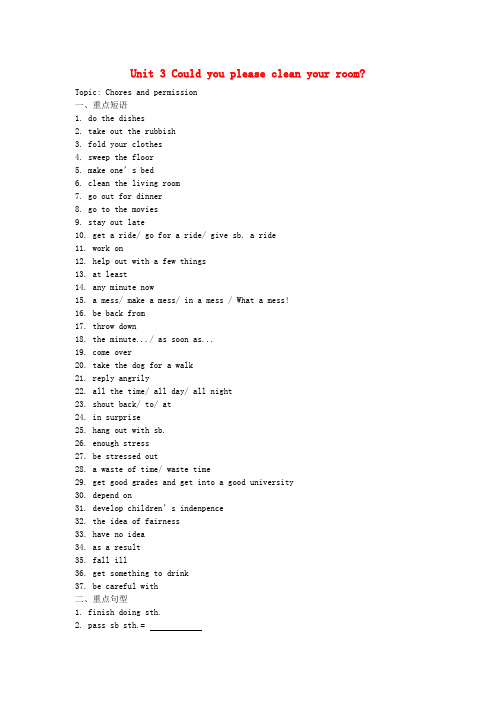
Unit 3 Could you please clean your room?Topic: Chores and permission一、重点短语1. do the dishes2. take out the rubbish3. fold your clothes4. sweep the floor5. make one’s bed6. clean the living room7. go out for dinner8. go to the movies9. stay out late10. get a ride/ go for a ride/ give sb. a ride11. work on12. help out with a few things13. at least14. any minute now15. a mess/ make a mess/ in a mess / What a mess!16. be back from17. throw down18. the minute.../ as soon as...19. come over20. take the dog for a walk21. reply angrily22. all the time/ all day/ all night23. shout back/ to/ at24. in surprise25. hang out with sb.26. enough stress27. be stressed out28. a waste of time/ waste time29. get good grades and get into a good university30. depend on31. develop children’s indenpence32. the idea of fairness33. have no idea34. as a result35. fall ill36. get something to drink37. be careful with二、重点句型1. finish doing sth.2. pass sb sth.=3. lend sb. sth. =4. borrow sb. sth =5. hate6. ask sb.7. invite sb. to sp.invite sb. to do sth.8. make sb.9. time /10. in order to do sth11. provide /12. there is no need for sb to do sth=13. mind doing sth.14. do one’s part in doing sth.三、词形变化1. (n.) ----angry(adj.) -----angrily(adv.)2. surprise (n. )---- (adj.)3. (n.) ----comfortable(adj.)4. invite(v.) ---- (n.)5. stress(n.) ------ (adj.)6. depend(v.) -----dependent(adj.) -----denpendency(n.)---- (adj.)------- (n.) opposite7. fair( adj.) ----- (n.)--- (adj.) opposite8. develop---- (adj.) ---- (n.)9. care (n/v.) ---- (adj.)--- (adj.) opposite四、好句欣赏1. I think two hours of TV (be) enough for you.2. Mom happy if she this mess.3. I am just tired you are.4. one week, she didn’t do any housework and .did any housework.she me did any housework.5. I finally understand that we need to share the housework (have) a clean and comfortable home.6. Could we just let them do their job as students?7. They should spend their time schoolwork in order to get good grades and get into a good university.8. It is the parent s’job (provide) a clean and comfortable environment at home their children.9. And anyway, I think doing chores is not so difficult, I do not mind doing them.10. It is not enough to just get good grades.11. Doing chores helps to develop children’s (independent) and teaches 22them how(take care) of themselves.12. Since they live in one house with their parents, they should know that everyone should do their part in keeping it clean and tidy.13. The earlier kids learn to be independent, the better it is for their future.五、Grammar(could)1. It is used as the past form of the modal verb .Mary could read by herself at the age of four.2. It is used to ask for permission.Could I please do…?Could I please use your phone?Could I practice playing the piano after school?How do we reply to these requests?3. It is used to make polite requests.Could you pleas e do … ?Could you babysit for us on Friday?Could you please turn on the TV for me?How do we reply to these requests?4. It can also be used to .A: I hope to work outside.B: You could help to clean up the city parks.5. People sometimes use “could” to .A: Whose book is this?B: I am not sure. It could be Carla’s. She was here just now.3。
八年级英语下册-Unit-3-Could-you-please-clean-your-room-Se
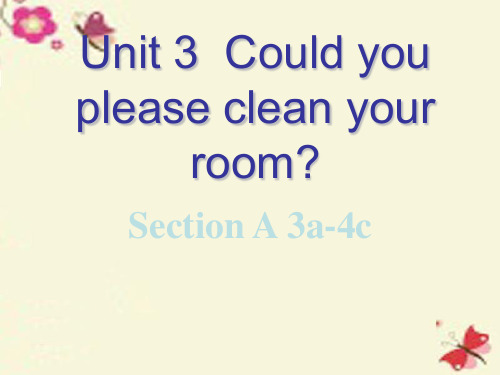
3b
Read the sentences below. Underline the sentences from the reading that mean the same thing.
1. Neither of us did any housework for a week. For one week, she did not do any housework and neither did I. 2. My mom came over as soon as I sat down in front of the TV. The minute I sat down in front of the TV, my mom came over. 3. You're tired, but I'm tired, too. Well, I work all day at school, too! I'm just as tired as you are!
not to get it wet.
1—d 2—a 3—c 4—e 5—b
4b Fill in the blanks in the conversation.
A: I hate to __d__o__ chores.
B: Well, I hate some chores too, but I like other chores.
2. Could I watch one show first? (noun) ___C_o_u_l_d_y_o_u__p_l_ea_s_e__sh_o_w__m__e_y_o_u__r_n_e_w__b_o_o_k_?__(v_e_r_b_)___ 3. I can't work all day. (verb) __I_t_’s__d_if_f_ic_u_l_t_t_o_f_in__d_w__o_rk__i_n_t_h_i_s_c_it_y_._(_n_o_u_n_)________ 4. You watch TV all the time. (verb) __H__o_w__m__u_c_h_i_s_t_h_a_t_w_a_t_c_h_?__(n_o_u__n_) _________________ 5. “What happened?” she asked in surprise. (noun) __I_t_w__o_n_'t__su__rp__ri_s_e_m__e_i_f_h_e_l_o_s_e_s_t_h_e_e_x_a_m__. _(v_e_r_b_)_____
Unit 3 Could you please clean your room?(解析版)
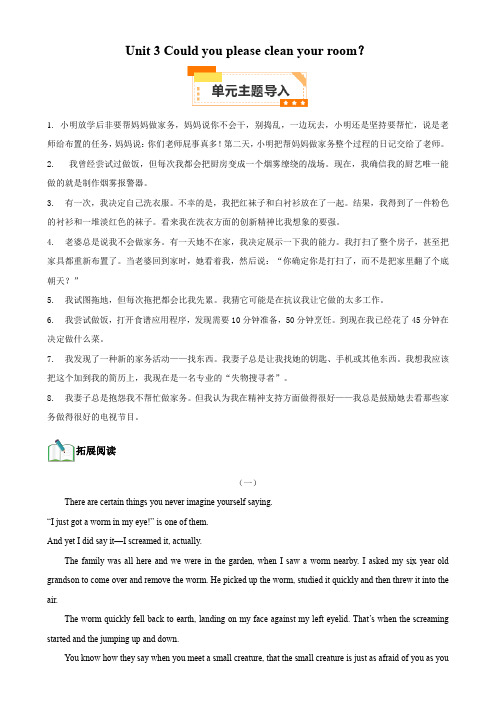
Unit 3 Could you please clean your room?1.小明放学后非要帮妈妈做家务,妈妈说你不会干,别捣乱,一边玩去,小明还是坚持要帮忙,说是老师给布置的任务,妈妈说:你们老师屁事真多!第二天,小明把帮妈妈做家务整个过程的日记交给了老师。
2.我曾经尝试过做饭,但每次我都会把厨房变成一个烟雾缭绕的战场。
现在,我确信我的厨艺唯一能做的就是制作烟雾报警器。
3. 有一次,我决定自己洗衣服。
不幸的是,我把红袜子和白衬衫放在了一起。
结果,我得到了一件粉色的衬衫和一堆淡红色的袜子。
看来我在洗衣方面的创新精神比我想象的要强。
4. 老婆总是说我不会做家务。
有一天她不在家,我决定展示一下我的能力。
我打扫了整个房子,甚至把家具都重新布置了。
当老婆回到家时,她看着我,然后说:“你确定你是打扫了,而不是把家里翻了个底朝天?”5. 我试图拖地,但每次拖把都会比我先累。
我猜它可能是在抗议我让它做的太多工作。
6. 我尝试做饭,打开食谱应用程序,发现需要10分钟准备,50分钟烹饪。
到现在我已经花了45分钟在决定做什么菜。
7. 我发现了一种新的家务活动——找东西。
我妻子总是让我找她的钥匙、手机或其他东西。
我想我应该把这个加到我的简历上,我现在是一名专业的“失物搜寻者”。
8. 我妻子总是抱怨我不帮忙做家务。
但我认为我在精神支持方面做得很好——我总是鼓励她去看那些家务做得很好的电视节目。
拓展阅读(一)There are certain things you never imagine yourself saying.“I just got a worm in my eye!” is one of them.And yet I did say it—I screamed it, actually.The family was all here and we were in the garden, when I saw a worm nearby. I asked my six-year-old grandson to come over and remove the worm. He picked up the worm, studied it quickly and then threw it into the air.The worm quickly fell back to earth, landing on my face against my left eyelid. That’s when the screaming started and the jumping up and down.You know how they say when you meet a small creature, that the small creature is just as afraid of you as youare of it? They lie.The worm showed no fear. I, however, am still having nightmares about the experience, which was several days ago.The most important thing in all this is that my grandson said he was sorry to me.I’d just been reading a book that makes a connection between adults doing the slow and hard work of teaching manners to children and greater levels of civility in society.Table manners, language manners and even manners in dress all show levels of self-control.Having self-control limits what we say and how we behave, making many of us appear a good deal better than we really are.Good manners also have the possibility to make mealtime a pleasant experience, even with small children.All of my grandchildren, except the ones that can’t yet talk, ask to be excused before leaving the table.It is a sign of respect for others at the table and a sign of respect for the meal itself. It’s also more pleasant than pushing one’s chair back and running for the back yard.Those tall enough, and even those not tall enough, also take their dishes to the kitchen.Manners are what civilize us—around our tables, in our families, homes and our communities.So when a little boy has the courage to apologize to a grandma who is screaming and jumping up and down, at least we know that our years of teaching young people manners are paying off—one worm at a time. 1.Where were they when the author saw a worm?A.In the house.B.In the garden.C.In the park.D.In the back yard.2.The worm fell down on the author’s________.A.leg B.head C.left eyelid D.right eyelid3.What does the underlined word “nightmares” mean?A.好运B.噩梦C.回忆D.愿望4.The author believed that his grandson’s apology is________.A.a good manner B.a bad behavior C.unnecessary D.a must5.What does the passage tell us?A.The importance of apology.B.The importance of good manners.C.Many kinds of good manners.D.A story of a worm.【答案】1.B 2.C 3.B 4.A 5.B【导语】本文主要以作者与其孙子的故事来讲述礼仪的重要性。
Unit3-could-you-please-clean-your-room-知识点及短语
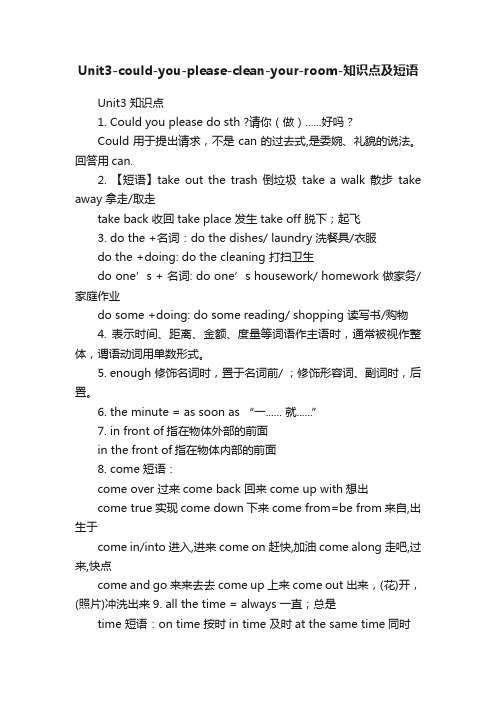
Unit3-could-you-please-clean-your-room-知识点及短语Unit3 知识点1. Could you please do sth ?请你(做)......好吗?Could用于提出请求,不是can的过去式,是委婉、礼貌的说法。
回答用can.2. 【短语】take out the trash 倒垃圾take a walk 散步take away 拿走/取走take back 收回take place 发生take off 脱下;起飞3. do the +名词:do the dishes/ laundry 洗餐具/衣服do the +doing: do the cleaning 打扫卫生do one’s + 名词: do one’s housework/ homework 做家务/家庭作业do some +doing: do some reading/ shopping 读写书/购物4. 表示时间、距离、金额、度量等词语作主语时,通常被视作整体,谓语动词用单数形式。
5. enough 修饰名词时,置于名词前/ ;修饰形容词、副词时,后置。
6. the minute = as soon as “一...... 就......”7. in front of指在物体外部的前面in the front of指在物体内部的前面8. come 短语:come over 过来come back 回来come up with想出come true实现come down下来come from=be from来自,出生于come in/into进入,进来come on赶快,加油come along走吧,过来,快点come and go来来去去come up上来come out出来,(花)开,(照片)冲洗出来9. all the time = always 一直;总是time 短语:on time 按时in time 及时at the same time同时the first time 第一次at times 有时last time上次next time 下次10. neither +助动词+主语“某人(主语)也不”neither …nor… 既不…也不…,做主语谓语动词符合就近原则。
2022年新人教版八年级英语下册第三单元知识点
Unit3 Could you please clean your room?一.情态动词could 旳用法1.提出礼貌旳规定Could you please (not) do sth ?请你(做)......好吗?用于提出祈求,但愿得到对方旳肯定回答,说话旳语调比较客气委婉。
Could 不是can 旳过去式,是委婉、礼貌旳说法。
回答用can.肯定回答:Yes,sure./ Yes, I can./Of course,I can./ Certainly./No problem./ With pleasure .否认回答:Sorry , I can’t / I’m afraid I can’t. I have to …,I’m going to…(阐明理由)2.表达祈求许可Could I do a sth? 我可以做......吗?肯定回答:Yes, you can ./ Yes ,please / Of course / Certainly./ No problem.否认回答:Sorry , you can’t / I’m afraid you can’t.3.could 为can旳过去式,表达过去旳能力。
= was / were able toSection A1. take out the rubbish把垃圾带出去2. do the dishes = wash the dishes洗碗碟3. fold your clothes折衣服4. sweep the floor扫地5. make your bed整顿床铺6. clean the living room打扫起居室7. do some washing/ shopping/ cleaning洗衣服/ 购物/ 做清洁8. go out for dinner出去吃晚饭9. go to the movies去看电影10. stay out late/ until nine呆到很晚/ 呆到9点钟11. get a ride撘车12. give sb a ride to town开车送sb到镇上13. need to do something需要做……14. have to do something不得不做……15. help out with a few things协助做些事情16. at least至少,多指数量或限度上旳最低限度。
Unit 3 Could you please clean your room_知识点讲义
人教版八年级下册Unit3讲义重点句法词法:一、Could 的用法Could表示有礼貌地提出请求,征求许可,其用法如下:1.Could 表示有礼貌地提出请求。
Could you (please) do...?表示“请你做...好吗?”could you (please) do...?的否定结构是在please 后加not。
Could you (please) open the window ?2.Could表示征求许可,希望得到允许。
句型Could I do...?表示“我可以做...吗?”Could I go to the movies?3.回答时应注意几个问题:(1)对这样的句式作答时,与其它的一般疑问句不同,作肯定回答通常用certainly, sure, of course等。
作否定回答时,通常以sorry开头。
(2)回答could引导的问句时要用can或can’t,不能用could。
二、情态动词表示说话人语气的单词。
不能单独做谓语,只能和动词原形1、情态动词没有人称和数的变化,情态动词后面跟的动词须用原形,否定式构成是在情态动词后面加"not"。
例: She can sing an English song.We should do our homework right now.I can’t speak English very well.三、情态动词的用法(1)Can的用法①表示体力或脑力方面的“能力”Can you speak English?你会说英语吗?②表示客观条件允许You can’t park your car here.你不能在此停车③can用在否定句和疑问句中时,有时表示说话人的怀疑,惊异、猜测或不肯定:He can’t be in the library。
他现在不会在图书馆。
四、borrow、lend、keepborrow和lend都有“借”的意思,但它们的含义和用法有所不同。
人教版 八年级英语 下册 Unit3Could_you_please_clean_your_room
invite my friends to a party
go to the store use your CD player
Listen to a conversation between Sandy
a party? Parent: No, you can’t have a party.
You have a test on Monday.
Parent: Could you please…? Child: Yes, sure. / Sorry, I can’t. I
have to ...
clean your room
parents
5. go to the store 6. use your CD player 7. take out the rubbish
parents 8. make your bed
1b Use the phrases in 1a to make
conversations.
Parent: Could you clean your room? Child: Yes, I can. Child: Could I invite my friends to
Li Lei can’t dance , neither can I. neither can Mary. neither can we.
Neither of …是both of … 的否定句 Both of my parents are teathers .(否定句) Neither of my parents is a teacher .
八年级英语下册 Unit 3 Could you please clean your
Unit 3 Could you please clean your room知识点:1. Could you please do…?请你……,好吗?Could you please not do…?请你不要……,好吗?例:Could you please not smoke here?请不要在这抽烟好吗?2. like doing=like to dohate doing=hate to do3. in a mess 混乱 The is in a mess. 这个房间很乱。
4. at lease 至少5. any minute 随时,马上同义说法: any second(秒),any moment(时刻),any time6.as soon as 一……就……(1)He left as soon as he heard the news.他一听到消息就走了。
(2)I will tell you as soon as he comes back.(注意“主将从现”)他一回来我就告诉你。
7.reply to sb. = answer sb. 回答某人8.in surprise 吃惊地9.neither of us 我们两个都不…,例:Neither of us have a car.我们俩都没车。
10. pass sb. sth. = pass sth. to sb. 例:pass me the salt = pass the salt to me11. borrow sth. from 如:borrow books from the library 从图书馆借书12. lend sth. to sb. = lend sb. sthCould you lend me you bike? = Could you lend your bike to me?13.try to do 努力/尝试去做某事try not to do 努力/尝试不去做某事14.a waste of time 浪费时间例::Playing computer games is a waste of time.15.in order to 为了……例: In order to get good grades, we should spend more time on schoolwork.为了取得好成绩,我们应该多花点时间学习。
- 1、下载文档前请自行甄别文档内容的完整性,平台不提供额外的编辑、内容补充、找答案等附加服务。
- 2、"仅部分预览"的文档,不可在线预览部分如存在完整性等问题,可反馈申请退款(可完整预览的文档不适用该条件!)。
- 3、如文档侵犯您的权益,请联系客服反馈,我们会尽快为您处理(人工客服工作时间:9:00-18:30)。
Unit 3 Could you please clean your room?教学目标:1语言目标:谈论做家务的词汇,及如何有礼貌的提出要求。
2 技能目标:能听懂和谈论做家务的话题;能写出重点单词和重点句型。
3 情感目标:培养学生爱劳动,分享家务的能力。
教学重点短语: do the dishes, make the bed, take out the rubbish, fold the clothes, sweep the floor, clean the living room ……句子:1. Could you please take out the rubbish?. Sure. / Sorry, I can’t. I have to finish homework first.2. Could I use your computer?Sorry. I'm going to work on it now.3. Well, could I watch TV?Yes, you can. But first you have to clean your room.教学难点:Make polite requestsAsk for permission课时划分:Period 1 Section A 1a – 2dPeriod 2 Section A 3a-3cPeriod 3 Section A Grammar focus-4cPeriod 4 Section B 1a-2ePeriod 5 Section B 3a-self checkSection A1 (1a – 2d)Step 1 Warming-upSing the song and dance to the musicStep 2 Presentation1. Watch the photos and talk about them “What does he do every day?’and learn these phrases: do chores, do the dishes, make the bed, take out the rubbish, fold the clothes, do the laundry, clean the living room.2. Look these phrases and practice the conversation: Could you pleasetake out the rubbish? Sure. / Sorry, I can’t. I have to finish homework first.3. 1a Do you do these chores at home? Discuss them with your partner. Step 3 Listening1b Listen. Who will do these chores? Check (√) Peter’s mother or Peter.Step 4 Practice1c Make conversations about the chores in 1a.Make conversations.ExamplesA: Could you please...?B: Yes, sure. /All right. /No problem./Certainly.Sorry, I can't. I have to do...Sorry, I can't. I am doing...Step 5 Listening 2a&2bPeter asks his father if he can do four things. What does his father say? Check (√) “yes” or “no”. Listen again. Draw lines to the reasons.Step 6 Practice2c Make conversations using the information in 2a and 2b A: Could I use your computer?B: Sorry. I’m going to work on it now.A: Well, could I watch TV?B: Yes, you can. But first you have to clean your room? 2d Role –play the conversationStep 7 Language points and summary1. help out 动词短语,表示在某人繁忙或遇到困难时“给予帮助”。
help和out之间还可以加入具体的“人”。
e.g. He helped me out with my task.他帮我完成了任务。
They helped (us) out with the clean-up.他们帮助我们做大扫除。
2. at least 至少e.g. We should brush our teeth at least twice a day.我们每天应该至少刷两次牙。
3. be back 回来e.g. I won't be back till 11:00.我11点以前回不来。
4. any minute now一种常见的口语表达法,相当于“随时;马上;在任何时刻”的意思,表示事情有可能在极短的时间内发生或眼下就要发生。
minute还可以用second, moment, time等词替换。
e.g. Don't worry, he will come here any minute now.别担心, 他会马上来这儿。
The guests are arriving any time now but we’re still not ready.客人即刻就到,但我们还没有准备好。
We’re expecting them any moment now.我们期待他们随时到来。
Step 8 Summary1. New vocabularydo the dishes, sweep the floor, take out the trash, make the bed, fold the clothes, clean the room2. ---Could you please…?---Yes, please. / Sorry, I can’t.Step 8 Homework1 List all the main phrases of doing chores that you know. (必做)2 Make a conversation between you and your mother, using the sentence pattern “Could you please …?”(选做)Section A 2 (3a – 3c)Step 1 ReviewA: Could you please make sentences with these phrases in the past tense? B: Sure. I did some chores.take out the trashdo chores do the dishes sweep the floor make dinner make the bed fold the clothes clean the living roomhelp out withat leastfinish doing sth.be back from shopping see this mess mother cleane.g. 1. A: Could you please......?B: Yes, sure./ All right./No problem./Certainly.Sorry, I can't. I have to do ...Sorry, I can't. I am doing ...2. A: What kind of chores did you do last weekend?B: I did the washes.Step 2 Reading3a Read the passage and answer the following questions.1. Did Nancy do any housework that day?2. Why was Nancy’s mom angry with Nancy?3. Did they solve the problem? How?3b. Read the story again and read the sentences below. Underline the sentences from the reading that mean the same thing.1. Neither of us did any housework for a week.2. My mom came over as soon as I sat down in front of the TV.3. You’re tired, but I’m tired, too.3c. Decide whether the underlined words in the sentences are verbs or nouns. Then write another sentence using the underlined word in the other form.1.Could you take the dog for a walk? (noun)2. Could I watch one show first?3. I can’t work all day.4. You watch TV all the time.5. “What happened?” she asked in surprise.Step 3 Language points1. You watch TV all the time and ...all the time(在该段时间内)一直;向来,一向;时时刻刻;每时每刻e.g. I do this all the time. 我一直是这么做的。
This happens all the time. 这种情况是时时发生的。
